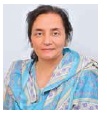Pakistani Woman Engineer Honored with America's Grace Hopper Award
By Riaz Haq

Dr Durdana Habib, senior faculty member at the School of Electrical Engineering, National University of Computer and Emerging Sciences, Islamabad, Pakistan is the recipient of the prestigious Grace Hopper ABIE Award for 2014 from the Anita Borg Institute in the United States.
The award is named after Grace Murray Hopper (1906-1992) who was an American computer scientist and United States Navy rear admiral. She was one of the first programmers of the Harvard Mark I computer, and developed the first-ever compiler for a computer programming language.
A press release by the Institute says that Dr. Habib has "motivated female engineering students to take up engineering careers". It adds: "She participated as an active volunteer in Women in Technology, a Task Force of the Technology Resource Mobilization unit under the Ministry of Science & Technology, Pakistan. She has involved female faculty as well as professionals across public and private sector through the Women's Forum, Interactive talks and WIE sessions at IEEE student Congresses. She is a mentor of the Pakistan Women's Forum (PWF) and is currently the Chair of the WIE Affinity Group, IEEE, Islamabad Section."
Dr Habib has worked at Communications Enabling Technologies where she led software development on System-On-Chip (SOCs) designs, according to the press release. Her team of many motivated female engineers developed one of the world’s highest density media processor SOC designs and filed several US patents.
There were very few women in engineering when I attended the NED Engineering College in the 1970s. Dr Habib and her fellow women engineers have since served as role models to encourage girls to study engineering in Pakistan. The result is that a third of all students at the NED University of Engineering and Technology are now female, according to a report by Inam Khwaja published in Karachi's Business Recorder newspaper.
As of 2012, the ratio of female-to-male enrollment in tertiary education in Pakistan is 95%, according to the World Bank . About 22% of adult women in Pakistan now work , up from 14% a decade ago. Women make up 4.6% of board members of Pakistani companies, a tad lower than the 4.7% average in emerging Asia, but higher than 1% in South Korea, 4.1% in India and Indonesia, and 4.2% in Malaysia, according to a February 2011 report on women in the boardrooms.

